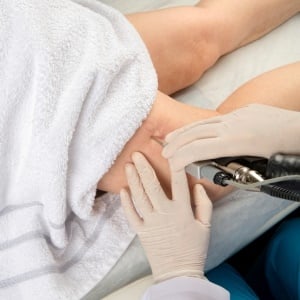
But a new study suggests the therapy also helps to restore function in other, smaller vessels, thought to cause about 20 percent of varicose veins.
Lasers are proving their worth in treating these often hard-to-reach veins, concludes the study, just presented at the Society of Interventional Radiology's annual meeting in New Orleans.
"Millions of patients who were misdiagnosed in the past and not well treated can now benefit from laser therapy," said study author Dr Robert Min, who pioneered and patented the use of laser therapy in the great saphenous vein.
Read: What are varicose veins?
"We found the treatment to be equally safe as it has been for the great saphenous vein and at least as good or better," he said.
How the research was done
The study assessed the use of endovenous laser ablation, or laser therapy within the vein, in 204 limbs of 192 patients treated over a 56-month period. According to the researchers, nearly all (96 percent) of the veins treated remained closed two years after laser therapy. In addition, patients reported no incidents of skin burns, nerve damage or other heat-related complications.
"Previously we didn't think these smaller veins could be treated with laser therapy because of concerns it would cause burns or injury," said Dr Rodney Raabe, an interventional radiologist at the Inland Vascular Institute in Spokane, Washington. "Min has found that we can successfully treat veins we previously thought we could not."
Read: When varicose veins could be a sign of something serious
In the study, ultrasound was used to accurately pinpoint faulty non-great saphenous veins. Subjects were given a local anaesthetic and then a small nick was made in the skin. Using a thin catheter and the guidance of ultrasound imaging, doctors threaded a thin laser fibre within the faulty vein and sealed it with laser energy.
Making the procedure more safe
In the past, doctors have been wary of treating these smaller veins because they often exist in close proximity to nerves and arteries. "There was concern that the laser would be too powerful," Raabe said.
But the study showed that the use of a local anaesthetic actually helped to make the procedure more safe. "The anaesthetic not only takes away pain, it also surrounds the target vein with fluid," said Min, an interventional radiologist at the Weill Medical College of Cornell University in New York City. "The fluid acts as a barrier to protect any non-target structures." Patients in the study did experience bruising, he said.
Read: Spray-on skin may heal leg ulcers
Doctors have traditionally used surgery to remove the veins, but recurrence rates are more than 25 percent. In contrast, laser therapy has a recurrence rate of less than five percent. Sclerotherapy - which involves injecting an agent into the vein to dissolve the inner lining - is generally used as a follow-up treatment to surgery or laser ablation.
Why people get varicose veins
Varicose veins are caused by weakening of the veins in the leg that carry blood up to the heart. In normal veins, the calf muscles tighten to push the blood up and valves open to allow the blood to travel up the leg. When valves leak and blood flows backward, known as reflux, the blood pools and veins bulge. Patients with varicose veins often experience leg pain and heaviness, cramping, and weakness.
The condition affects up to 25 percent of the population. Women are far more likely than men to suffer from the condition, said Raabe. Genes, hormones and a history of pregnancies are all risk factors. People who stand for long hours, such as nurses or teachers, are also at risk.
Min noted that successful treatment does not mean patients are cured for life. "If you have a genetic predisposition, you are at risk for developing varicose veins in the future," he says. Most patients will need follow-up visits to the doctor, he said, and occasional treatments.
Read more:
Leg pain signals deadly blood clots




 Publications
Publications
 Partners
Partners











